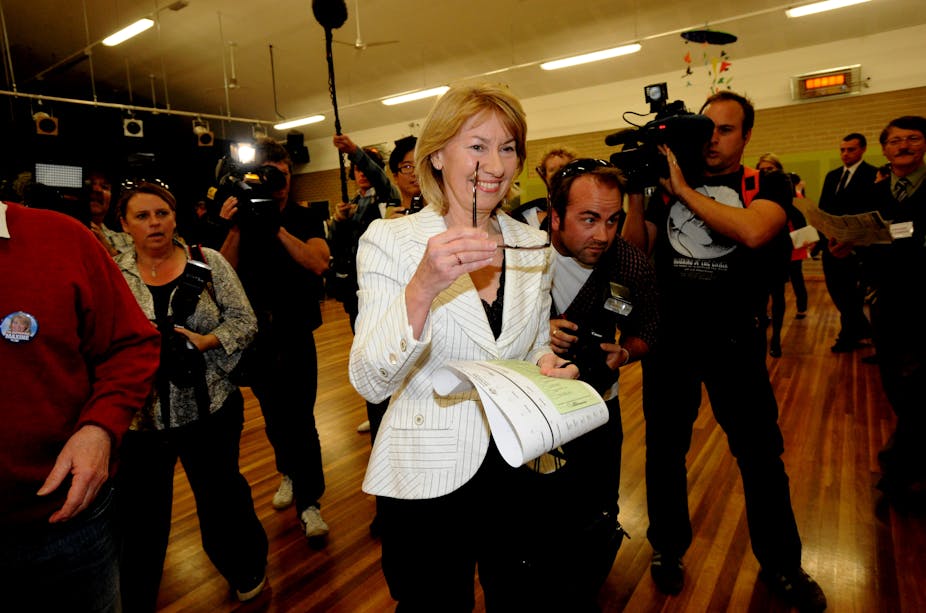The Rudd government came to power in 2007 with the reforming zeal of Gough Whitlam’s team more than three decades before, but was ultimately betrayed by a self-serving and brutal ALP machine according to former Labor MP Maxine McKew.
Speaking with La Trobe University’s Dennis Altman ahead of the launch of her political memoir Tales From The Political Trenches, McKew, who was widely respected as a journalist at the ABC before “jumping the fence” into politics, says anti-Rudd forces within the caucus used internal party polling to destabilise the sitting prime minister ahead of Julia Gillard’s move to challenge for the leadership.
McKew also addresses the current debate over misogyny in Australian politics, observing that while Tony Abbott has been forced onto the defensive by Gillard over many of his statements and actions towards women, the ALP also has an internal culture of sexism that requires remedy.
Dennis Altman: Let’s begin with the contest of ideas. You were very clear that there needed to be a new set of values and ideas brought to Australia and that you think that came with the election of Rudd in 2007. One of things that rather puzzled me as I was reading the book is virtually no reference to a couple of crucial areas that I thought you would’ve talked about: one was foreign policy, and the other was asylum seekers.
Maxine McKew: In terms of foreign affairs, I think the most critical thing, of course, that Rudd did, very early on, if you like he was as swift and as bold in his vision as was Whitlam in terms of wanting Australia to be engaged in the wider world and very quickly he identified Australia had to have a seat at the top table so what does he do? He gets Australia into the G20. He’s critical in pushing and pushing for that and I think that’s a substantial coup. Of course, the other thing he did very early on was to say “we are going to make a bid to have a seat at the Security Council”.
Dennis Altman: What was your experience, going into the Australian Parliament as an already established public figure, did you come across the sort of sexism that is now being claimed as the normal experience of women?
Maxine McKew: In terms of Labor politics, certainly the sexual politics is pretty rough and ready, you might recall in the early section of the book it was made very clear to be by Eric Roozendaal, a former state secretary of New South Wales that a safe seat could be found for me but it would be a highly conditional proposition and I remember him looking at me in Sussex street and saying “Well the question is Maxine, who would own you? Us or your hubby?” So that is not untypical. Now I didn’t fall down faint but I didn’t want to be owned by anyone.
Now you might call that patriarchal, sexist, whatever you like, but this whole question of how you navigate your way through the Labor party as a woman or indeed as a free-thinker, an independent thinker, someone who insists on playing the game a certain way, such as John Faulkner. This is the biggest issue the Labor Party is facing.
Dennis Altman: Looking back do you think it would have been better had you immediately not stepped into a parliamentary secretaryship but actually sat on the backbenches for a term and learnt the arcane processes of how the parliament works?
Maxine McKew: Yes. Absolutely. I have thought about that, but given the way things played out I had close friends pushing me to ask Rudd for a ministry. I certainly didn’t think I was up for that. But there are no prizes in politics for hiding away under a bushel. It’s all about making the mark, it’s all about, these days, being an instant success, getting immediate runs on the board, demonising your opponents. The whole contest of ideas is secondary or, I would argue these days, almost buried. That’s been part of the disappointment that I think I’ve noted and written about. But I think you’re right, I was an oddity, a political amateur up against exceptional political professionals and I think that was difficult for me to chart.
Dennis Altman Towards the end of the book you talk about, in effect, the need for Labor to regain some overall sense of what it stands for, what its values are, what it offers as an alternative to Australia. I have to say that I can’t quite tell where the difference is in what you see as Labor standing for and what Julia Gillard sees Labor standing for.
Maxine McKew Well I think the difference is that I’m not interested in sectional appeals. I’m not interested in the Labor party that only argues to smaller and smaller groups.
Now whether you look at Gough Whitlam or Bob Hawke or Paul Keating or Kevin Rudd, they were only successful because they knitted together a broad based coalition. The Labor base, the progressive middle, self-employed individuals, migrants in our major cities. We have lost that capacity to speak across the board. We are playing class warfare, we’re playing gender warfare, and we are playing the geographic divide, I mean, early this year Julia Gillard was talking about the “North Shore versus the rest”. There are actually Labor voters on the North Shore.

